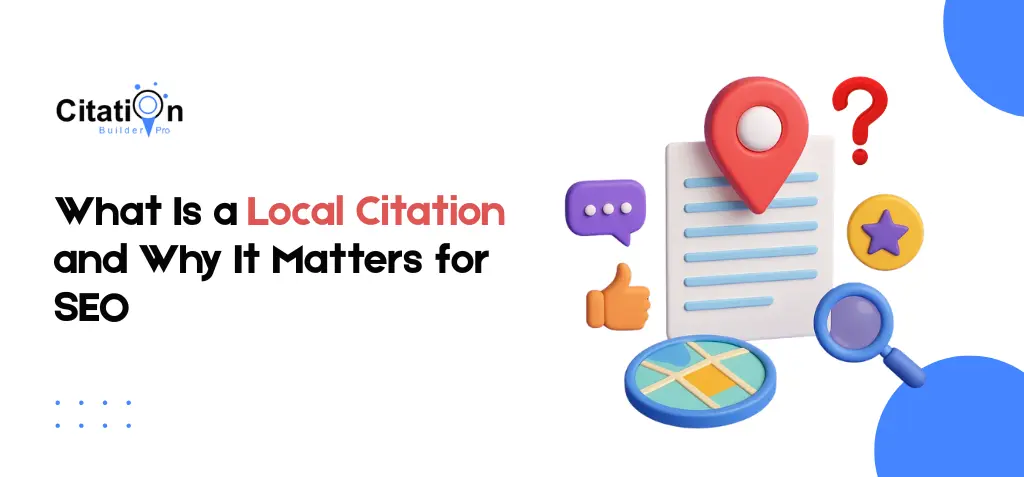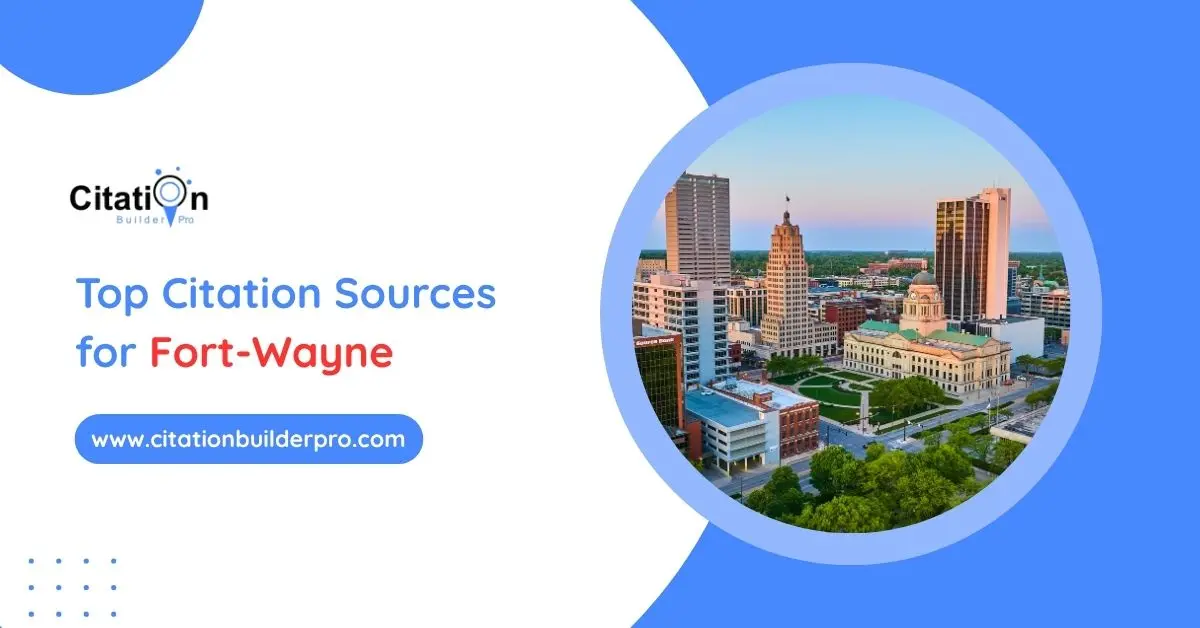Ever searched for a local business like a dentist or coffee shop and wondered why some show up everywhere while others barely exist online?
Here’s the thing: visibility in local search isn’t luck. It’s strategy. And one key part of that strategy is something most businesses overlook local citations.
Citations might sound simple just your business name, address, and phone number (NAP). But they quietly influence how Google and customers perceive your brand’s credibility.
Let’s break it down: what local citations really are, why they matter for SEO, and how you can build, manage, and track them effectively.
Table Of Contents
1. What Is a Local Citation?
A local citation is any mention of your business’s Name, Address, and Phone Number (NAP) online.
Citations can appear on:
Business directories (Yelp, YellowPages, Bing Places)
Industry-specific platforms (e.g., Healthgrades for medical clinics, Houzz for contractors)
Social platforms (Facebook, LinkedIn, Instagram business pages)
Data aggregators and map services (Google Business Profile, Apple Maps)
Even unstructured places like blogs, local news sites, and online reviews
Structured vs Unstructured Citations
Structured citations follow a fixed format on directories and listing platforms.
Example: Yelp, Google Business Profile, Bing Places.Unstructured citations are contextual mentions in blog posts, news articles, or local press features.
Both matter. Structured citations give Google factual consistency. Unstructured ones provide context and authority.
2. Why Local Citations Matter for SEO
Local citations are not just digital listings they’re trust signals.
Here’s why they matter:
2.1. They Validate Your Business Information
Google uses citations to verify your legitimacy. When your NAP data is consistent across the web, it reassures search engines that your business exists and serves real customers.
2.2. They Improve Local Search Rankings
Citations are a local ranking factor.
According to a BrightLocal study, citation signals (volume, accuracy, and consistency) influence where your business appears in Google’s Local Pack results.
2.3. They Increase Brand Visibility
Each citation is another door leading customers to your business.
Even if a directory doesn’t directly pass SEO “juice,” it still provides visibility especially when users search within those directories themselves (like Yelp or Angi).
2.4. They Build Trust with Users
Consistent business info builds credibility. If your phone number or address varies across listings, customers (and Google) start questioning your reliability.
3. Types of Local Citations
3.1. Core Directory Citations
These are major listing platforms like Google Business Profile, Bing Places, Yelp, and Facebook.
Every business should start here they’re trusted by both users and search engines.
3.2. Industry-Specific Citations
Platforms tailored for your niche (e.g., ZocDoc for doctors, Avvo for lawyers, TripAdvisor for hospitality).
These provide contextual authority something general directories can’t match.
3.3. Geo-Specific Citations
Local chambers of commerce, city business directories, and local news publications.
These strengthen your geographic relevance.
3.4. Unstructured Citations
Mentions in blogs, social media posts, or press releases that refer to your business naturally.
These add diversity and authenticity to your backlink profile.
4. How Local Citations Affect Local SEO
Let’s talk impact.
When Google crawls the web, it looks for signals that confirm who you are, where you operate, and what you offer. Citations reinforce this data.
But it’s not just about having more citations it’s about having the right ones.
4.1. Relevance and Authority Matter
Ten listings on niche-relevant, high-DA sites outperform 100 random low-trust directories.
Use a Local Citation Finder to identify high-authority sources for your industry.
4.2. Consistency Is Critical
Inconsistent NAP data confuses Google.
Minor differences like “Street” vs “St.” or “Suite #4” vs “Ste 4” can fragment your online identity.
4.3. Citations Support Google’s Knowledge Graph
Accurate citations help Google connect the dots between your website, maps listing, and third-party data boosting visibility in Local Packs and Maps.
5. Common Citation Problems (and Fixes)
| Problem | Why It Hurts | Fix |
|---|---|---|
| Inconsistent NAP | Confuses search engines, lowers trust | Audit all listings and standardize NAP |
| Duplicate Listings | Dilutes ranking signals | Remove or merge duplicates |
| Outdated Info | Misleads customers | Update every time your business changes details |
| Irrelevant Directories | Waste crawl budget | Focus on niche & authority sites only |
| Manual Submission Errors | Missed opportunities | Use trusted tools to automate & verify |
6. How to Build Local Citations (Step-by-Step)
Step 1: Audit Your Existing Citations
Use tools like BrightLocal or Moz Local Citations to find all mentions of your business and identify inconsistencies.
Step 2: Fix Errors and Duplicates
Clean up incorrect listings. Accuracy first, quantity second.
Step 3: Submit to High-Authority Directories
Start with core directories → move to niche and regional sites.
(This is where services like Citation Builder Pro streamline submission, verification, and management at scale.)
Step 4: Create Unstructured Mentions
Guest posts, case studies, and local news features work well.
Example: a cleaning business cited in a “Top 10 Service Providers in 2025” article.
Step 5: Track and Maintain
Re-audit quarterly. Ensure all new business updates (like hours or phone numbers) are reflected across listings.
7. Measuring Citation Impact
If you can’t measure it, you can’t improve it.
Here’s how to know whether your citation work is paying off:
Google Business Insights: Track increases in calls, direction requests, and profile views.
Local SERP Position Tracking: Use rank trackers to see improvements in “near me” searches.
Referral Traffic: Check how many visitors come from citation sites.
Crawl Frequency: More frequent Google crawls often indicate higher trust.
The goal isn’t just more listings it’s better visibility and verified consistency.
8. Advanced Tips for Better Citation Strategy
Don’t chase volume – Focus on directories that rank for your business keywords.
Add rich data –categories, descriptions, images, hours, reviews.
Use UTM parameters – to track performance of major citation profiles.
Maintain branding consistency – same tone, logo, and NAP format everywhere.
Automate at scale – with reliable citation management platforms when handling multiple locations.
9. How Citation Builder Pro Simplifies It
Building citations isn’t about speed it’s about precision. At Citation Builder Pro, every listing is created manually to guarantee 100% accuracy, consistency, and relevance across all major directories. Unlike automated systems that rely on software to push data, our process ensures every detail is reviewed, verified, and optimized for local SEO impact.
Our expert team performs an in-depth citation audit to locate existing listings, fix inconsistencies, and remove duplicates that could hurt visibility. Once your business profile is clean, we hand-pick high-authority directories based on niche, geography, and domain strength targeting trusted platforms in the US, UK, AUS, CAN, and other regions. Each submission includes complete business information, rich media, and accurate categories to help listings look authentic and perform better.
We also analyze your competitors’ citation footprints to identify missing opportunities and directories where your brand should be visible. This competitor-driven approach ensures your business isn’t just listed it’s positioned to outrank others in local search results.
Every order ends with a white-label citation report containing live URLs, login credentials, and submission statuses, giving you full transparency and proof of manual work.
By combining human precision with strategic selection, Citation Builder Pro delivers trusted, high-quality manual citations that strengthen your local SEO foundation and boost your visibility where it matters most in front of real customers searching for your services.
10. Key Takeaways
Local citations are foundational to local SEO success.
Focus on accuracy, authority, and relevance, not just numbers.
Clean, consistent citations equal better visibility and credibility.
Regular audits and maintenance prevent ranking drops.
A managed approach (with tools or services) saves time and ensures quality.
Conclusion
What this really means is: your local SEO strength isn’t just about keywords or backlinks it’s about trust signals that tell Google your business is real, reliable, and active.
Citations are that trust layer.
Get them right, and your business appears where it matters most right in front of people ready to buy.
Start by auditing your listings today, fix what’s broken, and build with intention. Because consistent citations don’t just boost rankings they build reputation.
Frequently Asked Questions (FAQs)
Q1. What is a local citation in SEO?
Ans: A local citation is any online mention of your business’s Name, Address, and Phone number (NAP). These citations appear on directories, social profiles, or other websites, helping search engines confirm your business information and improve your visibility in local search results.
Q2. How do local citations help SEO?
Ans: Local citations boost trust and consistency two major signals search engines look for when ranking local businesses. The more accurate and consistent your listings are across trusted sites, the higher your chances of appearing in Google’s Local Pack and map results.
Q3. How many local citations does a business need?
Ans: There’s no fixed number, but quality matters more than quantity. Aim for high-authority, niche, and geo-relevant directories instead of submitting your business everywhere. Even 50–100 quality citations can make a significant difference if they’re accurate and complete.
Q4. Are manual citations better than automated ones?
Ans: Yes. Manual citation submissions ensure every detail from business name to category is entered correctly. Automated tools can miss fields, create duplicates, or use outdated data. Manual submissions are more reliable for maintaining NAP consistency.
Q5. How often should I update or check my citations?
Ans: You should audit your citations at least twice a year or anytime your business info changes (like address, phone number, or hours). Regular checks help prevent outdated listings and maintain your rankings in local search results.
🚀 Ready to Boost Your Local SEO Visibility?
Get your business listed on high-authority directories with 100% manual submissions and guaranteed NAP consistency. Start today and make your business visible everywhere that matters!
Trusted by agencies and local businesses across 50+ countries 🌍
How useful was this post?
Average rating 5 / 5. Votes: 1
No votes so far! Be the first to rate this post.

With 15+ years of experience in custom SaaS development, product, management focused on digital media and multi-platform customer experience. Over the last 10 years, I have established 4 successful businesses and managed 100+ people between the four businesses.




